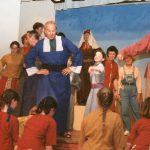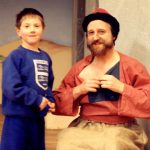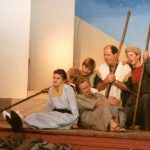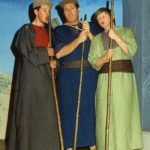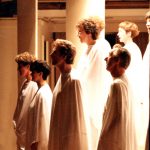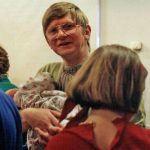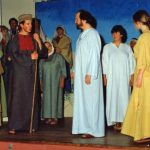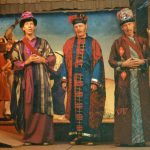 A Christmas Musical: World Premiere
A Christmas Musical: World Premiere
Book by Alison Faulkner
Music by Peter Farndon
1st-5th December 1992 (six performances)
Most nativity stories centre around the problems of Mary and Joseph. But they weren’t the only people in the story. How did the Innkeeper feel as he declared that there was no room for a young girl about to have a baby? Did the shepherds understand completely what the angels told them or was it only the sight of the infant Jesus which brought comprehension?
This musical set out to help us in some way to think about how this glimpse of glory affected the ordinary people of Bethlehem. It has a family argument and a love story, humour and the innocence of children. Most of all it has the conviction that what was represented in the story still affects us today:
On with our life: labour and strife,
Things of the earth in time will surely pass away.
But we won’t forget
How we all met God’s tiny son
And felt his love fill us that day.
This musical was our second to be written by two SMASH members. Its message proved to be very powerful and moving through an excellent script and tuneful, powerful music.
In response to public demand, SMASH decided to restage Born For Us All for the millennium when parts of the script were reworked and new songs added.
Proceeds were for work in South America, Africa and UK home missions.
Synopsis
It is census time in Bethlehem and the town is preparing for visitors (Money – Jacob, taxman, Levi, children, townsfolk). There is great excitement because the visitors will bring money which will make everyone’s life more comfortable. The action centres around Jacob, the keeper of the inn, and his family. He expects them to work hard and make money but they wish there was more to life than that.
His wife, Ruth, is tired form all the preparations and remembers the past, when Jacob appreciated her more and money-bags less (Some nights I just sit here: Ruth).
Out on the hills the shepherds discuss their lot (Counting sheep: shepherds). Jacob’s daughter, Sarah, has fallen in love with Andrew, one of the shepherds, and comes to see him. The other shepherds make fun of them, especially as Sarah does not appreciate the social stigma associated with the life of a shepherd.
The following morning, Bethlehem is alive with traders and visitors. Money does not solve all problems. Levi, the winemaker, and Jacob are complaining about the attitudes of their children (What shall we do about the young generation?: Jacob, Levi, children, parents). Levi hints to Jacob that Sarah is seeing a shepherd. Jacob is furious and confronts her. When she admits that she loves Andrew, her father lectures her about how poor, dirty and unrespectable shepherds are and how he wanted better for her. He forbids the relationship.
Many travellers are still on their way (The road to Bethlehem: travellers, solos and chorus). Mary is very tired. She and Joseph remember what the angel told them about Mary’s baby being God’s son. They reflect that neither of them had thought that his birth would be in such strange circumstances. (The audience are encouraged to laugh at Mary’s pregnant state in order that the poetry of the annunciation is heightened in contrast).
In a scene where there are many comic lines where the audience least expect them, Mary and Joseph arrive at Jacob’s inn. There are no rooms left and Jacob won’t let them in. Ruth tries to help but Jacob refuses to be involved, reminding his wife that there is no room and anyway she is too tired to be of any help. Ruth insists that they use the stable and takes them there. They reflect on how the Son of God is to be born in such a humble place (In this poor stable, Mary, Ruth, Joseph).
Sarah goes to the shepherds’ camp to tell Andrew that their relationship is over (You and I must part: Sarah, Andrew, Shepherds). This realises the other shepherds; expectations.
Jacob’s younger children have overheard Ruth praying to God for the special baby and creep out to see him, fetching their friends as well. They all visit the stable and are filled with joy (The special baby: children, townsfolk).
Interval
Angels appear to the shepherds and tell them to go to Bethlehem to find the Christ child (News of Great Joy/Gloria: angel and chorus). Andrew doesn’t want to go because he suspects that the baby is in Jacob’s inn and he doesn’t want to see Sarah.
On her way back from the fields, Sarah goes into the stable and tells Mary the problems with her father. Mary reminds her that a father’s advice is often motivated by love. Mary sings (Lullaby: Mary) to Jesus.
The shepherds visit the stable
They sing for joy in the courtyard and awaken the whole house. Jacob is furious and refuses to go and see the baby as Sarah and Ruth ask him to. It is Andrew who persuades Jacob that a saviour has eben born in his stable and that he should see for himself. Jacob is sceptical but finally realises that a miraculous birth has taken place (How can this be?: Jacob, chorus, Mary, Joseph, shepherds).
A few days later, some wise men arrive. They recount their travels and explain that they are searching for a new king (The books were right: wise men, children, chorus – calypso). The baby is brought outside for them to see.
Jacob is much happier and more pleasant to his children. He has learnt much from the fact that God chose to give his news to the lowly shepherds. Now he believes that one should not despise people because of the job they do, nor the money they earn. He tells Sarah that she may be reconciled to Andrew.
Joseph has a dream in which Herod’s actions are foretold (Joseph’s dream: angels, chorus). The holy family leave.
Sarah goes to Andrew and professes her love (Let’s be together again: Andrew, Sarah, chorus).
A Roman soldier bursts in on the townspeople. On Herod’s orders, he is searching for male babies. Rumours have been flying that the inn is the birthplace but he can find no baby. He takes Jacob’s gold instead. Jacob (no longer the money-loving businessman of the first act) feels that his priorities have changed since the birth of Jesus (Born for us all: Jacob, Ruth, chorus).
Unfortunately we have relatively few photographs from the production as the photograph album was “borrowed” and has never been found.
- What shall we do about our children?
- Jacob receives help with his microphone
- Counting sheep
- Three shepherds
- Glory be to God on high
- Shepherd and baby Jesus
- Andrew asks Jacob to see the baby
- The books were right!
